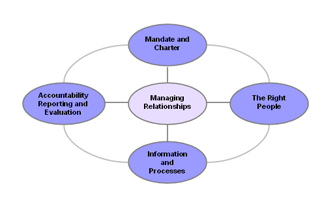(‘o-d&t “kä-mi-‘tE ) , – n. a body of persons with governance responsibilities delegated to consider, investigate, take action on, or report on a formal examination of an organization’s accounts, financial and control situation, or methodical examinations.
Audit Committees are widely recognized as senior board committees that have front line governance responsibilities related not merely to financial reporting, but also to the oversight of continuous disclosure, corporate reporting, and internal controls and risk management. As a committee of the board (or in the public sector as mandated by Treasury Board policy), the audit committee must carry out its duties within the framework of the governance principles and practices set out in its approved charter, working in collaboration with the board, external / internal auditors, and senior management.
Systematic oversight by audit committees ensures that corporate governance is effective for resource management, internal controls, financial reporting, and risk management through interaction and interdependence among the key players. As set out in “Integrity in the Spotlight: Audit Committees in a High Risk World”, the five elements of audit committee effectiveness is represented below.

Click the image above to view a larger version in a new window.
Sound stewardship is an integral component of every audit committee’s fiduciary responsibilities to strengthen oversight and sound management of public and private resources entrusted to the organization within a well articulated financial management governance framework.
Understanding audit committee roles and responsibilities are essential in the drafting of the charter. For example, Canadian Securities Administrators Multilateral Instrument (MI) 52-110 – Audit Committees, requires that audit committees have a Charter that sets out minimum responsibilities of effectiveness for which it is accountable, including:
- the committee’s role in the oversight of the organization’s financial reporting and disclosures – including reviewing the organization’s quarterly and annual audited financial statements, management discussion and analysis (MD&A) (or FSD&A in the case of the public sector), and financial disclosures before they are publicly disclosed;
- the committee’s oversight of the appointment of the external auditor, the auditor’s accountability and the audit activities to be performed – recommending to the Board (or the Deputy Head in the public sector) the external auditor, their compensation, and the nature of the audit and pre-approving all non-audit services to be provided by the external auditor;
- the committee’s oversight of risk management and control, including disclosure controls and internal control over financial reporting – including the review of management certifications or representations in their Statements on Internal Control disclosures; and
- other oversight responsibilities that may be assigned to the audit committee by the Board or suitable governance body – such as satisfying itself that adequate disclosure control procedures are in place, and the review of corporate ethics and codes of conduct.
Is your Audit Committee effective? Do you have the right elements in place? Does your Audit Committee have a sound governance charter? Are you in control? Do you have the tools to respond effectively? icorp.ca’s Insight service can help you discern the inner nature of complex audit committee requirements and governance. So who is supporting your Audit Committee needs?
In summary
All organizations, regardless of size, need to develop a process to evaluate the design of internal control. The requirements for certifying / reviewing the design of internal control are now in place. Starting now will contribute to an effective evaluation and enable management to identify deficiencies early and prior to the reporting deadline. At the same time the Audit Committee should determine the extent of its involvement in the oversight of this process and communicate its expectations to management.
Do you have the assurance you need to support critical decisions? Do you have the assurance needed to discharge your fiduciary responsibilities? Is your current approach relevant and effective? icorp.ca’s Assurance Review services can help you discern complex policy decisions. So, who is supporting your assurance review and evaluation strategy? GO THERE!™
For more information about icorp.ca’s Insight expertise, contact us.


